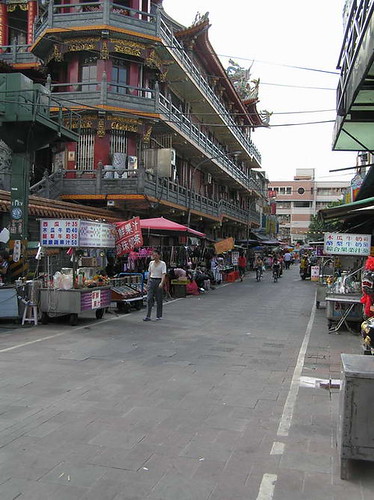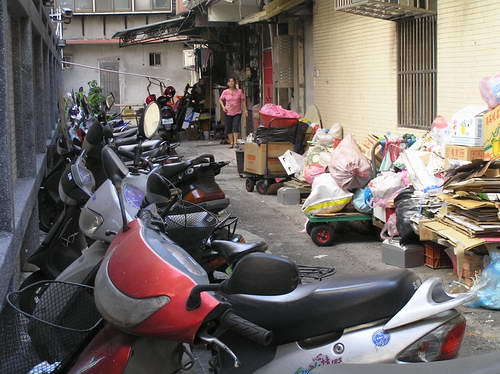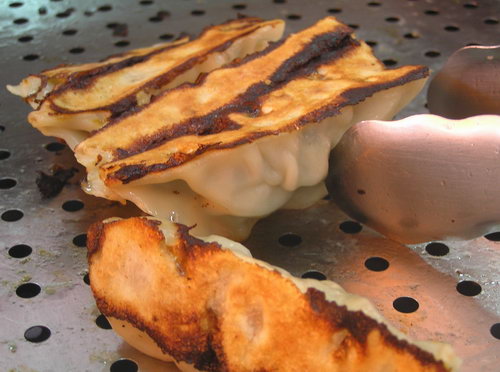ESWN's Roland Soong does a great service with his translations of Chinese-language media articles and often insightful commentary. His recent coverage of the bizarre case of a National Yunlin University of Science and Technology professor who may have
cast a Taoist spell on another member of the faculty is a good example of his keen eye. I would be the first to say that I have learned a lot from his prolific posting.
However, when it comes to Taiwanese politics, Roland has an unfortunate tendency to select and amplify the views of Taiwan's pro-China media. This is doubly unfortunate because of the influence Roland apparently enjoys on foreign correspondents based in China. Rebecca MacKinnon recently posted the results of her survey on
blogs and China correspondents, in which she noted:
ESWN and Danwei appear to be substantially more important to correspondents than other English-language China-focused blogs. [MacKinnon's emphasis]
In this rather long post, I summarize and comment on a typical example of ESWN's misleading work on Taiwanese politics: ESWN's treatment of
DPP Chairman Yu Shyi-kun's dispute with the China Times and then translate an unrelated Chinese-language post that gives a far different impression of the whole affair. What I find particularly objectionable and intellectually dishonest are ESWN's rhetorical gestures toward objectivity by giving 'both sides' of the story and his suppression of the context that even relatively informed readers (such as China-based correspondents) need to make a critical judgment.
Yu Shyi-kun and the DPP: Enemies of Press Freedom?ESWN paraphrases coverage of DPP Chairman Yu Shyi-kun's order prohibiting members of the party's leadership from giving interviews to the China Times and the China Times editorial response. ESWN's account however strongly suggests that Yu and the DPP are intolerant of press freedom, or in the very least are willing to sacrifice press freedom in the name of political expediency.
The Taiwan Journalist Association said yesterday that when the media publish inaccurate reports, the subject has the right to ask the media to retract/clarify as well as take legal action. Public figures have the obligation to be monitored by the media and criticized by the public Meanwhile, the media should stick to the professional duty to report accurately in terms of investigating and commenting.
Yesterday nineteen journalists on the DPP beat signed a joint letter to criticize the DPP for violating the reporting rights of the media. But the appropriate DPP officials called and applied pressure at several electronic media outlets. Shortly after the letter was released, the reporters from FTV and TTV withdrew their names from the letter.
In other words, professional journalists believe that Yu is "violating reporting rights." And the DPP strong armed dissident journalists who work for pro-DPP media outlets into withdrawing their voices from this consensus. But note carefully the unexplained statement that "the media should stick to the professional duty to report accurately in terms of investigating and commenting." This appears to be a general statement about the professional duties, but it in fact refers to a very specific and egregious breach of that duty as we shall see. ESWN chooses to let this pass without comment.
Next DPP sources are cited to show that even Yu's own party doesn't think much of the prohibition.
DPP legislator Huang Wei-Cher said that Chiang Kai-shek even read People's Daily. He believes that a boycott of China Times would have no effect. Another legislator said that the people of Taiwan generally suspect that the media are biased, and Yu is merely reflecting that belief. The boycott of China Times this time can be considered a tactical ploy by Yu in his presidential run.
While the nameless DPP legislator admits that Yu's prohibition will probably be popular with his party's rank and file, he then quickly reduces it to a cynical 'political ploy.' Yu doesn't actually believe in the boycott himself. He's just pandering to his supporters. In fact, one of the DPP's most important successes in the last year or so has been to convince its supporters that the mainstream media is dominated by pro-China interests who are eager to sell Taiwan down the line. This was borne out by the recent mayoral election results that shocked so many experts. Unlike the experts, DPP voters are tuning out the pro-China media.
Back to ESWN. Having set the table by quoting a neutral source and DPP sources, ESWN can now balance his story by translating the voice of the other side. A complete translation of the China Times editorial response to Yu's order follows. I'll comment on this in another post, but the point is while gestures have been made toward journalistic objectivity by quoting the two sides of the story plus a neutral authority, the take home message is that Yu (and extension the DPP) are enemies of press freedom.
Far worse in my view though is ESWN's failure to explain why Yu is suing the paper and why he feels that the China Times can't be trusted to report responsibly on the DPP
Who Said 'Chinese Pigs'?A remarkably
detailed post by He Bi over at
Hi-on casts a very different light on Yu and his beef with the China Times. My translation follows with my notes in square brackets []. The headings in this section are He Bi's:
The first hearing in DPP Chairman Yu Shyi-kun's lawsuit against the China Times over the "Chinese Pig incident" was held on Dec. 28th. While taking questions from the media at Taipei District Court that morning, Yu announced that starting Dec. 28th, DPP party headquarters would no longer allow the China Times to cover party headquarters and that the DPP will no longer endorse or confirm China Times reporting about the DPP.
Yu said that the China Times used to be a liberal paper [in the sense of classical liberalism] and was comparatively objective and neutral. But ever since Wang Chien-chuang became editor in chief of the China Times, the paper's news coverage had gone badly off key.
[Note that Wang Chien-chuang was the editor of The Journalist when Annette Lu succesfully sued the magazine for defamation after the The Journalist ran a story that they couldn't prove claiming that Annette Lu had said in taped phone call that Chen Shui-bian and Hsiao Bi-kim were having an affair. The bad blood between the DPP and Wang goes back along way.]
[Skip a paragraph about Yu's silly punning on the name of the China Times.]
Archives of the 'Chinese Pig' Incident
The Sept. 25th edition of the China Times ran a front-page story stating that "DPP Chairman Yu Shyi-kun's comments about 'Chinese pigs' 中國豬 is causing controversy within the DPP." [underlined in red in the scan below.]
 The China Times Ignores Yu's Protests
The China Times Ignores Yu's ProtestsBeginning on September 21st, the
China Times ran repeated stories mentioning that Shih Ming-teh or Wang Li-ping had said on multiple occasions that DPP Chairman Yu Shyi-kun had called people in the anti-Chen movement 'Chinese pigs.' The DPP released several statements denying this, but the China Times not only refused to publish a retraction, but also went ahead and published the front-page Sept. 25th story on the broad political situation in which the paper said that Yu's "incendiary comments about 'Chinese pigs' 中國豬" were triggering opposition within the party." Yu decided to sue the paper for libel based on this story.
Let's review the real facts. The phrase 'Chinese pigs' first appeared on page A3 of the Sept. 19th edition of the United Daily news and page A4 of the
China Times. A China Central News agency story released at noon the same day also used the phrase.
On the night of Sept. 18th anti-Chen demonstrators and Chen supporters clashed in Kaohsiung. On page A3 of its Sept. 19th edition, the
United Daily Newss ran a story by Chen Jinsheng 陳金聲 and Xiong Naiqi 熊迺祺 with the headline "Six Hour Standoff Ended by Dawn Strike." The story stated:
"This is Dog Beating City [Kaoshiung] not Taipei City. Chinese Pigs go home." At around 11:00pm nearly 2,000 Chen supporters were staring at less than 100 red-shirted anti-Chen demonstrators across a police line and crowd control barriers. The Chen supporters were highly emotional: Shouts of "Go A-bian! Go Taiwan!" were mixed in with screams from air horns. One could smell the explosive atmosphere.
The
United Daily News story did not identify who said "Chinese pigs," but from the context, the story seems to be identifying someone in the crowd of Chen supporters as having shouted the phrase. Incidentally this story was very quickly quoted in the [Malaysian]
Sin Chew Daily and other overseas Chinese media.
The
China Times ran a story by Jiang Huizhen 江慧真 and Fanjiang Taiji 范姜泰基 headlined "Shih Ming-teh: Bloody Conflict Only Hurts the Chen Regime" on page A4 of its Sept. 21 edition. This story was the first time that the phrase 'Chinese pigs" was uttered by Shih Ming-teh, the leader of the Red Army on Ketegalan Boulevard:
...Shih Ming-teh went on to accuse DPP headquarters of deliberately twisting the anti-Chen movement into "Chinese bullying Taiwanese" and wanting "Chinese pigs" to go back home. [The DPP's] inflaming and controlling the passions of the ten percent or so of the people will only lead to more polarization and greater divisiveness in Taiwanese society...
The Central News Agency then released a story headlined "The Double Tenth Siege? Wang Li-ping Says No Need to Apply for Permit" at 12:53pm the same day by reporter Wen Xianggui 溫貴香. The story reported:
...Wang Liping went onto the stage and told the sit-in participants that Yu was a "politcian without a conscience" for called anti-Chen protestors "Chinese pigs." She said that the chairman of the ruling party was creating internal contradiction within Taiwan by constantly dividing, provoking, and tearing apart the Taiwanese people and that his love for Taiwan was a love that excludes...
On September 22, the
China Times ran a story on page A3 by reporters Luo Rulan 羅如蘭 and Xiao Xucen 蕭旭岑 headlined "Anti-Chen Headquarters Criticizes Electronic Media for Smearing them Red: Plans to Sue." The story stated "...Anti-Chen Movement Vice Convener Wang Liping criticized DPP Chairman Yu Shyi-kun for having called the anti-Chen movement Chinese pigs and said that he was "politcian without a conscience."
Shih Ming-teh and Wang Liping Stuff 'Chinese Pigs' into Yu's MouthThe Sept. 22 edition of the China Times ran a story on page A4 by reporter Luo Ru-lan headlined "Shih Ming-teh Apologizes for Red Shirt Demonstrators' Beating People." The story reported:
...Shih Ming-teh said that Yu had called [罵] the anti-Chen movement for being "Chinese bullying Taiwanese" and had called him [Shih] " a Chinese pig." Shih said that he had at least led Yu Shyi-kun and Chen Shui-bian onto the streets to shout down [the KMT government]. "Do you mean that you were being led by a Chinese pig back then?"...
The Central News Agency released a story on Sept. 23 at 11:01pm by reporter Lin Yijun with the headline "Shih Ming-teh Cries: Feels Hurt at Being Called Chinese Pig." The story stated:
...Anti-Corruption Campaign Convener Shih Ming-teh said today that he was really very sad that his DPP friends had fallen so far. Even someone like him was being called a "Chinese Pig," "a Chinese Bullying Taiwanese," and the "Number One Warrior in the Sell Out Taiwan Gang." Shih was so hurt by this that he cried on stage and off stageIn its Sept 25th front page story by Lin Shuling 林淑玲 and Cai Huizhen 蔡慧貞 "Going over the head of the Party and the Presidential Office, Su [Tseng-chang] Invites Leaders from All Parties to Discuss National Affairs" the China Times said that:...DPP Chairman Yu Shyi-kun's recent moves to counterattack against the anti-Chen movement and his incendiary comments about "Chinese pigs" are triggering opposition within the party. President Chen meanwhile accepted Yu's invitation to attend a "Seminar on Constitutional Reform" and said that there was a need to resolve issues in the current constitution relating to national territory. As anti-Chen demonstrations rage on, the president and the party are aligning themselves with the depp greens. But Su Tseng-chang is holding bipartisan meetings that are putting him on a very different path than the one Chen and Yu are on: a path to the center...
TVBS then ran a story at 6:16pm on Sept. 25th entitled "Who Said Chinese Pigs? Yu Accuses Wang Liping: Wang Says She Doesn't Remember." The story reported that:
Wang Liping has changed her statements and is now saying that she doesn't know who said it:...But if we look for the source, we find that reporters from most papers have quoted Wang Liping as publicly saying at the sit-in on Ketagalan Boulevard that Yu Shyi-kun had called the anti-Chen movement "Chinese pigs." But while giving an interview to a TVBS reporter, she has changed her story and is distancing herself from the statement in low key way....[Wang said] she doesn't know who said it and that legal disputes should be left to Yu and the media to resolve.
The China Times Issues an Apology the Next Day with a Brief StatementOn Sept. 26th the
China Times ran a story on page A2 with the headline "Yu Shyi-kun Sues Media for Reports that Yu Said 'Chinese Pigs.'" The story reported on Yu's denial and that he had filed a lawsuit. That same day the paper also ran a brief statement of correction (小啟) from the "China Times Editorial Department" stating:
 DPP Chairman Yu Shyi-kun recently had made statements including "the anti-Chen movement is Chinese bullying Taiwanese" that have raised concerns about ethnic conflict in all sectors of society. We have, however, reviewed this matter and have determined that Chairman Yu never said the phrase "Chinese pigs" as reported in this newpaper's front page on Sept. 25th. We hereby rectify [this error] and apologize to Chairman Yu.
DPP Chairman Yu Shyi-kun recently had made statements including "the anti-Chen movement is Chinese bullying Taiwanese" that have raised concerns about ethnic conflict in all sectors of society. We have, however, reviewed this matter and have determined that Chairman Yu never said the phrase "Chinese pigs" as reported in this newpaper's front page on Sept. 25th. We hereby rectify [this error] and apologize to Chairman Yu.
An Apology in the Back Alley? Yu Shyi-kun to Press SuitFaced with clear evidence of its error, the
China Times formally apologized in Sept. 26th. But the paper failed to change its practice of "Cussing people out on main street but apologizing in a back alley."
On Sept. 30th, the DPP held a "Taiwan Stand Up" rally in Kaohsiung. Yu Shyi-kun issued a Three Dont's policy against the China Times: "Don't buy, Don't read, and Don't advertise." Yu criticized the paper for its unfair coverage over the last year and its outrageous smears against and distortions of the DPP. In particular, Yu said, his recent discussion of national identity had been twisted into an attempt to stir up ethnic issues. In fact, Yu said, those who are actually stirring up ethnic issues are in the "pro-China media" He accused the China Times of having no journalistic integrity and said he would pursue them to the extent of the law.
[End of translation]
Imagine for a moment if the New York Times falsely reported in a front page story that the chairman of the Republican Party had called anti-war protesters 'niggers' and that the paper then had reluctantly published a rinky-dink half apology inside the paper after the subject of the story had attempted for days to correct the story. You bet our hypothetical chairman would be furious. And that his organization wouldn't be granting (note the discretionary nature of the English word) any interviews to the Times. I'd also bet that the editor of any self-respecting paper who made an error like this would be fired. But no, Yu and the DPP are enemies of press freedom.



 The recent case of "corruption" in the Tainan Science Park vibration damping technology bid isn't what it looks like on the surface. What's really going on? Well, the defendant is Green, and the prosecutors are Blue.... Taipei Times gave the bare facts (
The recent case of "corruption" in the Tainan Science Park vibration damping technology bid isn't what it looks like on the surface. What's really going on? Well, the defendant is Green, and the prosecutors are Blue.... Taipei Times gave the bare facts ( Today the Taipei Times hosted an call from several local pro-Taiwan academic societies for
Today the Taipei Times hosted an call from several local pro-Taiwan academic societies for 

















